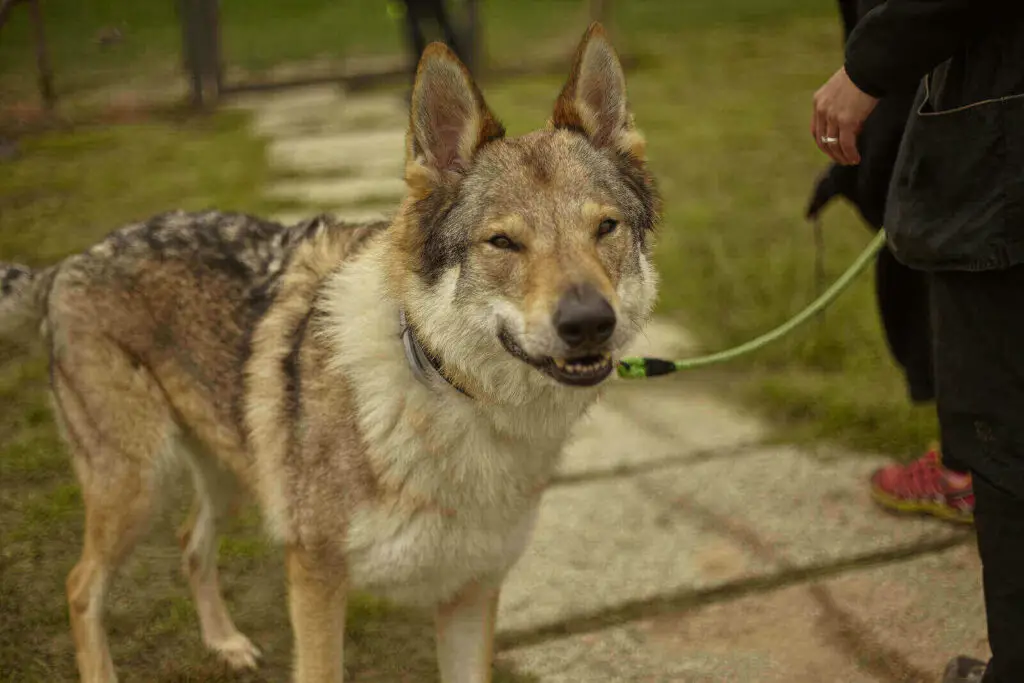Wolf dogs are hybrids obtained by mating dogs with wolves. But can dogs mate with wolves in the first place? Well, it has been known for ages that dogs and wolves are capable of mating and breeding. The result of such breeding is what we refer to as a wolf dog.
The dog and wolf breeding may happen naturally, in the wild. It may also happen under a controlled situation (with captive wolves). Either way, what we get is a wolf dog.
A simplistic way of putting it then would be by stating that a wolf dog is half-dog, half-wolf.

Wolf dogs are fascinating creatures. People often have all manner of questions about them. Those include questions on the origin of these wolf dogs and whether they are suitable pets. Others are on how to recognize the wolf dogs, how to train them… and so on.
If you too have such questions, you are in the right place. That is because we will be answering most of those questions in this article.
Can Dogs Mate With Other Animals?
We have already stated that wolf dogs come into being when dogs mate with wolves. But that can be a startling statement to some people. You see, there are many people who are unaware of the fact that dogs can indeed mate with wolves. Or with any other animals. Thus, we have to start by tackling the question on whether dogs can mate with other animals.
As it turns out, there are indeed at least a couple of other animals that dogs can mate with. The first animal that dogs can mate successfully with is the wolf. That results in the wolf dog which is the subject of this article. So you know how to respond when you encounter the common question: can dogs mate with wolves. Yes they can, to produce wolf dogs.
The other animal with which dogs can successfully mate with is the coyote. The resultant creature in this case is known as the ‘coydog’.
Can Dogs Mate With Wolves?
We need to dig deeper on the matter of dogs mating with wolves.
Biologists often encounter that question: can dogs mate with wolves? And the answer, as we have said, is in the affirmative. Evidence for such mating between dogs and wolves is to be found in the wolf dogs.
That often leads to another question: are dogs and wolves the same species. The answer to that question is somewhat tough. That is because certain types of wolves are indeed in the same species with dogs, whereas others aren’t.
All available evidence shows that gray wolves are indeed the same species with domestic dogs. For other types of wolves, the case may be different. But when it comes to gray wolves, those are indeed in the same species with domestic dogs. This is why most wolf dogs in existence are a result of gray wolf and domestic dog mating.
A question arises: how then can dogs mate with wolves (non-gray wolves) if they aren’t the same species? The mating of dogs with gray wolves is understandable: given they are in the same species. But what about the other types of wolves? How do they get to mate with dogs, which are of different species?
The best answer is in their ‘closeness’. They may not exactly be the same species. But they are so close that inter-breeding is possible. Anyway that is the best answer to the oft-asked question. (The question on how can dogs mate with wolves if they are not the same species).
3 Signs Dog and Wolf Can Mate
Can a dog mate with a wolf? Where is exactly the evidence?
Well, evidence for dog and wolf mating can first of all be found in the existence of wolf-dogs. These, as asserted earlier, are half-dog half-wolf creatures. They can only have come into being as a result of dog-wolf mating.
The second evidence for dog-wolf mating is in the genes. We find lots of domestic dog genes in certain wolf populations. We similarly find lots of wolf genes in certain domestic dog population.
The third evidence for dog-wolf mating is in the fact that dogs and gray are actually wolves the same species. And as well know, one of the defining features of a species is the ability of its members to inter-breed
Wolf Dog History
Archeological evidence suggests that dogs and wolves share a common ancestor. The two species (if they may be considered so) parted ways some thousands of years ago. But there have nonetheless been continued interactions between them.
Under certain pressures, wolves have been known to reproduce with dogs. This answers the common question on can dogs mate with wolves naturally? So the answer is yes, but usually only under certain circumstances. It tends to happen when there are challenges getting mates in the actual wolf population. So the wolves resort to dog mates. The result of such mating is always the wolf-dog.
Is It Illegal To Have A Half Wolf Dog?
In some places (indeed in most places) it is illegal to keep a pet wolf dog. That is because there are concerns that the half wolf dogs can be dangerous. There are also those who have concerns about the whole practice of getting dogs to mate with wolves. They consider wolves to be wild animals in need of protection, rather than exploitation.
Further, as noted earlier, it is common to be asked: can dogs mate with wolves? Once some individuals learn that indeed dogs can be made to mate with wolves, they over-react. They become squeamish about the whole thing. Some suddenly feel that it is not right — and press for restrictions.
There are however a few places where you can keep a half wolf dog: usually subject to meeting certain requirements. For instance, there are enclosure restrictions. If you want to keep a hybrid wolf dog in most places, you need to have a strong enough enclosure. That is to keep the wolf hybrid dog from escaping and potentially hurting other people.
Does My Dog Have Wolf In Him?
You can tell if your dog has wolf in him by observing his appearance and behavior. Dogs with wolf genes will tend to be bigger in size, with bigger legs and straight sturdy ears.
If your dog has agouti cover, there is a good chance that he has wolf genes in him. Similarly, if your dog barks less. And he seems to howl more. In that case, there could be a chance of him having wolf blood in his veins.
Which Breed Of Dog Is Closest To Wolf?
Most people view the Alaskan Malamute as the dog breed that is closest to a wolf. But we also have those who argue that the Akita breed and the Siberian Husky are the closest to wolves.
We already mentioned something about the gray wolves. That with regard to the wolves themselves, the variety that is closest to the dog is the gray wolf. Conversely, the dog breeds mentioned above, are viewed as being very close to the wolf. Those alongside the likes of the Saluki and Lhasa Apso .
Still in answering the question on ‘can dogs mate with wolves’ we need to come one thing in mind. We need to remember that the mating is not restricted to the wolf-like dogs breeds only. Even the least wolf-like dogs can still mate with wolves under certain circumstances.
Are Wolf Dogs Dangerous?
It is a commonly held belief that wolf dogs are more dangerous than ordinary dogs. Indeed, many of the people who pose the common question (can dogs mate with wolves) have one thing in common. They are usually individuals in search of fiercer dogs.
Unfortunately, the evidence shows that wolf dogs are not exceptionally dangerous as a group. What we tend to find is a situation where temperaments differ from one wolf dog to another. For instance, you may find one Yuki wolf dog that is very calm. Just next door, you find another Yuki which turns out to be a very fierce dog.
Or you go to one ranch and find a wolf mixed with husky dog that is very tough. Then you visit the adjacent ranch, only to find another rather easy going husky wolf mix dog. So theirs’ are like human temperaments. Just as our temperaments differ greatly, so do wolf dogs’.
Much also depends on the wolf dog’s training. There are people who train their hybrid wolf dogs in a manner deliberately designed to make them very fierce. Then there are those who train their wolf dogs with intention to make them as gentle as possible.
In the final analysis though, we make one finding. We find that the genuine wolf dog breeds tend to be (on average) fiercer than other dogs.
Are Wolf Dogs More Aggressive?
As suggested above, wolf dogs are on average fiercer than other dogs. This translates to aggressiveness as well. We find that wolf dogs – generally speaking – are more aggressive than other types of dogs. But there are individual differences in temperament. It is possible to encounter a very calm wolf dog once in a while.
How Do You Discipline A Wolf Dog?
The best approach in disciplining a wolf dog is that of using positive reinforcement. This applies whether you are training genuine wolf hybrids or normal dogs that just happen to have wolf dog appearance.
So when the dog does what you approve, you reward him. With time, as per Pavlovian conditioning, he will come to see the link between good behavior and rewards. He will therefore start doing more of what you approve and less of what you disapprove. You will have won.

How To Train A Wolf Dog?
The most important thing in training a wolf dog is to first establish a bond of trust. Get the dog to see you as a friend, someone who has his best interests at heart. The second important thing is to be reasonably slow. Focus on getting him to learn to learn just a few things per day.
The third important thing is to ensure that you are consistent in your training.
Finally, you need to make full use of positive reinforcement. It works better than punishment approach in getting the wolf dog to behave how you want.
How Much Does A Wolf Dog Puppy Cost?
Wolf dog puppies generally don’t come cheap. This is because of their ‘special’ and ‘unique’ nature. The average wolf dog price is typically quoted in thousands of dollars: even if it is just a puppy.
For a true wolf hybrid dog, you would probably need to have at least $2,000. That can go up to as much as $5,500 or even $6,000. The latter would be the case if the dog is one of those that are considered to be particularly good. So for a wolf dog puppy, you need something in that range: $2,000 to $6,000.
Those figures can look ridiculously high. That is especially like to be the case to someone who is new to wolf dogs. The sort of person who is still trying to find answers to questions like ‘can dogs mate with wolves’? But anyone who knows the true worth of wolf dogs would appreciate what they get for such expenditure.
In any event, much depends on how the market is like. You know, like whether you can actually find a genuine wolf dog hybrid for sale in the first place. What you may keep on running into are dogs with wolf-like appearance, rather than true wolf dog hybrid breeds. So for the genuine wolf dogs, the higher prices are justified.
What States Can You Own A Wolf Dog?
States that allow you to own a wolf dog without too much hassle include Texas, Utah and Ohio. Others are Oregon, Minnesota and North Carolina. Most of the other states will allow you to keep a wolf dog, subject to meeting certain stringent requirements.
Are Wolf Dogs Loyal?
The loyalty of wolf dogs depends on their training. By nature, these are quite independent creatures and loyalty to human masters doesn’t seem to be innate to them. But with proper training, it is possible to inculcate a good degree of loyalty in them.
That said, there are limitations. You are unlikely to ever train a genuine wolf husky mix dog to be as servile as, say, a poodle.
In other words, wolf dogs don’t always display their loyalty in the same manner as ordinary dogs. And this often sees them mistaken for disloyal dogs.
Do Wolf Dogs Shed?
Yes, one of the defining features for genuine wolf dogs (just like all wolf breeds) is almost year-round shedding. So while buying a wolf dog, a good brush would be a good accessory investment as well.
How Smart Are Wolf Dogs?
Wolf dogs can be best described as intelligent creatures that don’t, however, like showing their smarts. They have a lot of intelligence for sure. But they are sometimes caught up in their own worlds. To the extent that their intelligence doesn’t always manifest easily to humans.
Are Wolf Dogs Good Family Pets?
It depends on the type of family in question. For a family with small kids, they are not. Neither are they good pets for a family with members who fear aggressive animals. They can however make good pets for an adventurous family in search of a unique, ‘tough’ dog.
Can Dogs Mate With Foxes?
After getting an answer to the question on ‘can dogs mate with wolves’, some people take it further. They seek to establish whether dogs can mate with foxes. Unfortunately, in this case, the answer is no. Dogs just can’t mate with foxes – forget what the fairy tales tell you.
Can a dog mate with a coyote?
The answer in this case is ‘yes’. Dogs can mate with coyotes (albeit with some difficulty). But the dog-coyote hybrids are infertile. They are unlike the dog-wolf hybrids, which are fertile.
Final Verdict – Can Dogs Mate With Wolves
We have provided an answer to the question on ‘can dogs mate with wolves’. We have seen that they can, and the result is the wolf dog. Further, we have provided answers to most of the frequently asked questions about wolf dogs.

If you have come to like the wolf dogs, what next? Well, the next course of action may be to consider buying a puppy. Of course, this would be subject to certain caveats.
Firstly, only if you are in a place where you are allowed to keep a wolf dog. And secondly only if you have what it takes to actually keep a wolf dog.

Welcome to Learn About Pet. My name is Rajkumar Ravichandran and I love all pets, travel, and amazing food. I write about my passion and personal experience caring for multiple pets in this blog! ❤️
Post Disclaimer
DISCLAIMER: THIS BLOG OR WEBSITE, "Learn About Pet", DOES NOT PROVIDE YOU WITH MEDICAL ADVICE AND IS NOT A SUBSTITUTE FOR MEDICAL ADVICE. ALWAYS GET IN TOUCH WITH YOUR PERSONAL VETERINARIAN AND USE INFORMATION HERE AS GENERAL ADVICE.
The information, including but not limited to, text, graphics, images and other material contained on this website are for informational purposes only. No material on this site is intended to be a substitute for professional veterinary advice, food recommendation, diagnosis, or treatment. Always seek the advice of your veterinarian or other qualified health care provider with any questions you may have regarding a medical condition or for pet food related questions.







